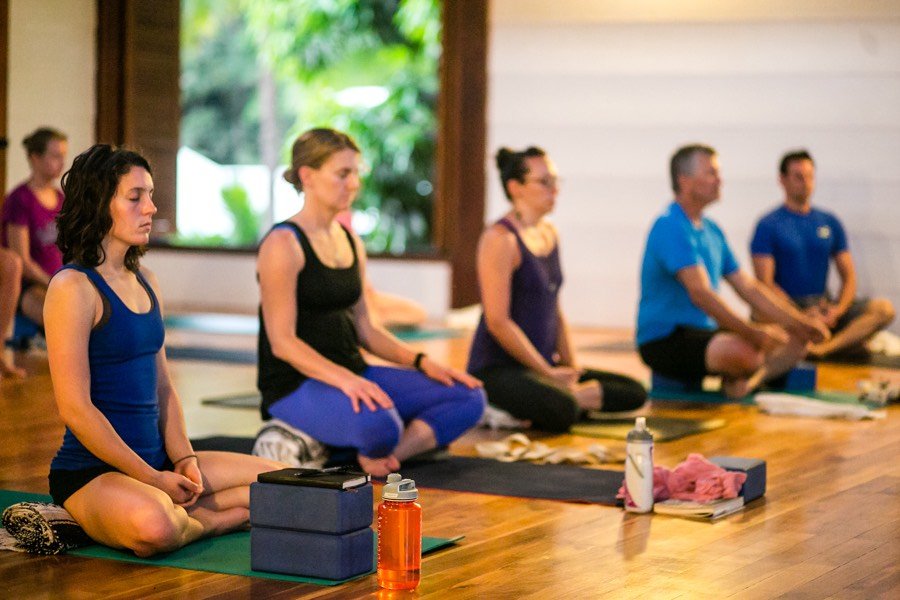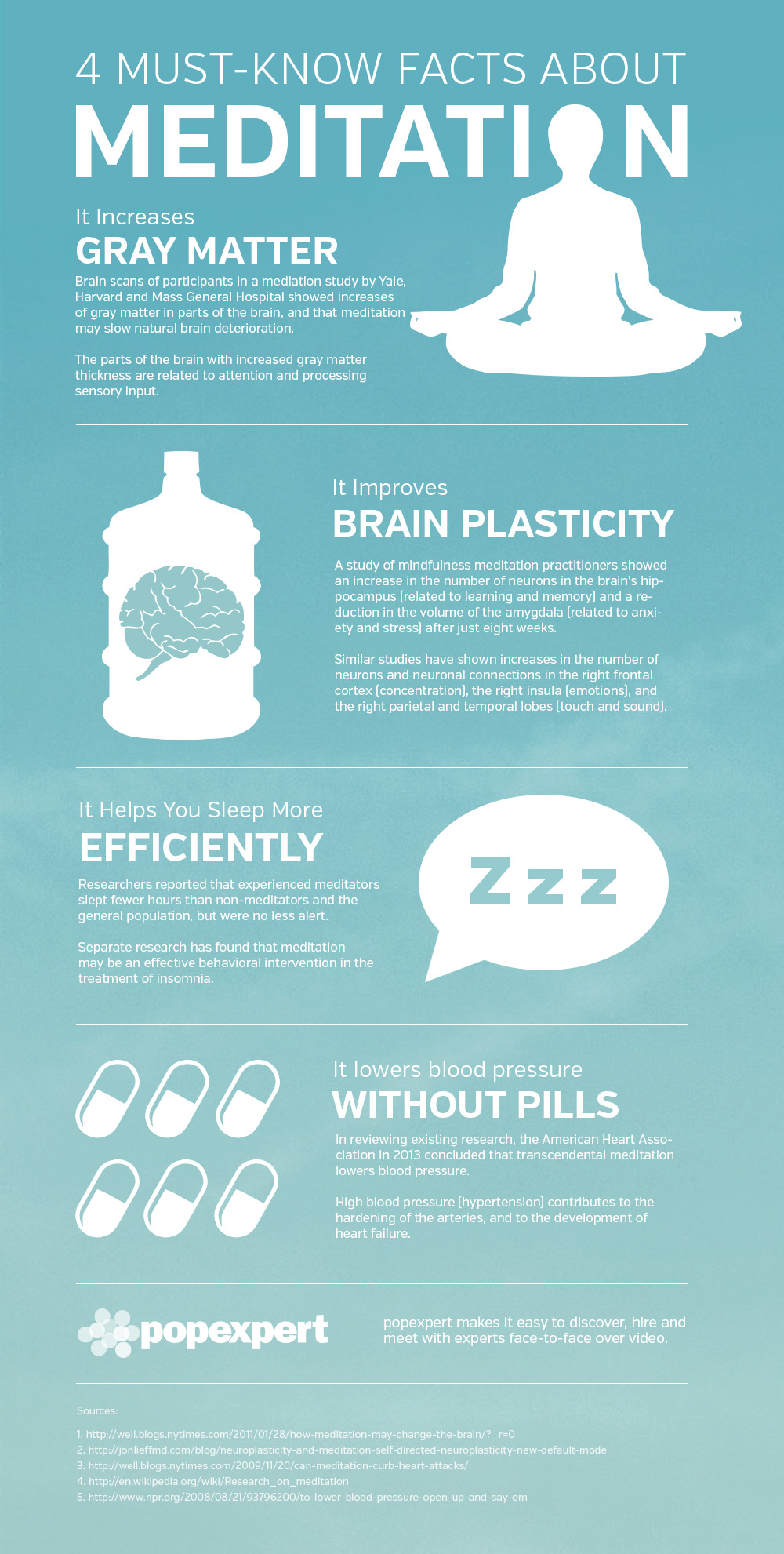Meditation is a pretty unfamiliar concept for those of us who have grown up in the West. But meditation is growing in popularity with more people turning to the practice.
We all know someone who meditates or talks about wanting to add meditation to their daily routine. This practice is trending more every day. And once you learn about the meditation benefits, you’ll be ready to start practicing on your own.
Normalizing Meditation Training
The mental health benefits of meditation are being talked about more and more. “Are you meditating?”
“You have to study mindfulness with my spiritual teacher.”
“You should consider teaching yoga so you can deepen your meditation practice!”
People are using these terms without understanding their meaning or significance.
So what exactly is guided meditation?
Sometimes the term is associated with relaxation. Yet meditation is not exactly the same thing as relaxation.
Meditation, or Dhyana, as referred to in the yogic tradition, involves both concentration and relaxation. It is the training of the mind, a process of learning to focus attention on one thing as a way to cultivate serenity, balance, and patience.
The purpose of the practice is to develop an inner state of awareness, become less reactive to the world around us and instead more contemplative, and increase inner peace.
People meditate for different reasons:
- to focus on clearing their mind for relaxation
- to reach a state of calm
- to use it as a spiritual practice to connect with Higher Power
- for healing benefits
The main goal is to develop our inner awareness, with an attentive mind, keeping our focus inward. When you practice meditation, you learn to quiet your mind, disconnect from the body’s senses, and reach a state of wakefulness with no distractions from the external world.

Why Meditate?
The fundamental goal of meditation is to reach a state of enlightenment. In this state, we feel liberated. Our conscious mind from the continuous flow of external chatter and thoughts.
We have little control over our thoughts. But with meditation, we can find the inner peace of stillness and transform our minds. We learn to separate from our confusing and restless thoughts. With practice, we achieve a state of mind that is harmonious, concentrated, and rested.
But there is so much more than just relaxation. There are so many other advantages of meditation.
People who meditate can calm their racing minds and be less distracted. But it takes time and practice to reap the benefits of mindfulness training.
The ability to achieve a harmonious, concentrated and rested mind is not easy or fast.We need to work our mind to create calmness, so we can see clearly.
One analogy of the mind is that it is like a lake.
If there is continuous wind-like the flow of thoughts on the surface, it forms waves.
The continuous waves of concerns, stress, fears, regrets prevent us from seeing the bottom of the lake. These constant waves prevent us from obtaining a state of mind that is harmonious, concentrated, and rested.
Imagine if there was no wind blowing over the lake of your mind. Imagine if there were no continuous flow of random thoughts.
The surface of the lake is calm and clear. We could look into the brilliance of ourselves. With gentle waves, we could unleash our hidden potential and observe the beauty within.
With a still, calm mind, with no wind, we can see within and find the beauty in ourselves.
In this stillness, we see the reality of life. We understand our mind is our greatest asset and our most valuable possession.
Mindfulness allows us to be more present. We can focus on the value of each moment and let the chatter pass by like floating clouds.

10 Scientific Benefits of Meditation to Consider
Whether you’re feeling stressed and want to reduce anxiety, or you’re navigating chronic pain and need an escape, meditation may be the answer.
1. RELAXATION
Meditation can take your body to an even more relaxed state than deep sleep.
During meditation, your body goes into a deep state of relaxation. This state of relaxation allows your body to heal and regenerate completely.
The Harvard Medical School has been one of the pioneers in scientific studies of the benefits and healing impact of meditation.
What they have discovered is that relaxation can change the chemistry of our bodies. A sitting practice helps to balance the body to its natural state with no stress or agitation.
Do you think this kind of relaxation will have a positive effect on various aspects of our daily life?
External stimulus distracts our body function, and it affects our mind and the chemical balance in our body. If stress is not managed correctly, it affects our adrenal glands.
The adrenal glands produce cortisol. Cortisol is a steroid hormone.
When produced excessively, it may harm our body. The extra cortisol in our body increases the blood sugar level and affects our immune system. This causes us to be less resistant to illness and disease.
Having a regular meditation practice can help you cultivate a steady and continuous relaxed state. This state allows you NOT to be affected by external circumstances or conditions.
2. CONTROL OF EMOTIONS, LESS AGITATION
Meditation helps you gain better control of emotions.
A relaxed mindset leads to less anxiety. As a result, there is reduced intensity of mood swings and anger episodes.
How good are you at dealing with your emotions?
Anger affects the function of the frontal lobe in our brain. Anger shuts down the frontal lobe, and you lose the ability to act rationally. This leads to a lack of awareness and irrational acts. Have you ever woken up the next morning wishing you had paused before operating out of anger?
When you are angry, communication becomes difficult. Anger releases the neurochemicals that destroy the parts of the brain that control emotional reactivity.
The more you meditate, the less reactive you become.
Welcome to living a more balanced life!
3. DECREASED BLOOD PRESSURE
Do you know anyone who suffers from high blood pressure? The answer is likely yes.
High blood pressure has, unfortunately, become a widespread issue among people of all ages. This stressful life we are living in nowadays is contributing to it.
How can we lower our blood pressure?
We have the solution. Instead of medication, try meditation.
The US National Institutes of Health has referred to the benefits of meditation to drop blood pressure as the most effective means for helping mild hypertension.
Remember that, as mentioned above, meditation promotes relaxation. This decreases stress levels, as relaxation reduces the activity of the adrenal glands.
Stress is one of the main reasons for high blood pressure. Adopting a regular meditation practice may allow you to get positive results in your next blood pressure test!
4. A DROP IN BLOOD CHOLESTEROL
Cholesterol is not as bad of a monster as the word echoes. It sticks our cell membranes together and helps in digestion, and in the production of vitamin D and sex hormones.
But cholesterol can be a problem when there is an excess amount of it. If we consume too much cholesterol, it gets into our blood and clogs the blood passages. This builds up and causes various other symptoms.
When we experience stress, the adrenal glands get activated and produce cortisol. (You remember what we said about cortisol.)
When produced in excess, cortisol destroys cells in our bodies. When cells get damaged, they are automatically matched up with cholesterol.
The higher the stress, the more cortisol gets released, more cells get damaged, and more cholesterol needs to be built to take care of the damage.
Meditation naturally reduces stress. It also helps us to focus, become calm, and deal with negative thoughts in a better way. Regular practice of meditation allows you to handle outer circumstances in a more peaceful way. Meditation helps you to become less reactive.
When you can maintain more balance in your emotions, you produce less cortisol. If you produce less cortisol, you produce less cholesterol.
Ready to begin a morning routine?
5. INSOMNIA
Research shows that one of the huge benefits of meditation and mindful practices is reducing insomnia.
Meditation increases blood circulation helping muscles to relax. The practice of mindfulness and meditation brings your mind to the present moment. This daily practice will help you to let go of the stresses of the day and the challenges of tomorrow.
The practice of falling asleep faster includes: – letting go of external worries – being present in the moment – doing some deep diaphragmatic exercises – preparing yourself for sleep.
Stress and worry make sleeping much more difficult!
When you experience stress, the adrenal glands are working overtime to produce adrenaline. A relaxed body stops the release of adrenaline and other hormones that keep you awake.
With consistent meditation practice, you will see experience deeper sleep very quickly.

6. CURING ADDICTIONS
Many of us in the modern world face addictions: alcohol, tobacco, food, sugar, prescriptions, drugs, sports, social media…
Not to worry, there are healthy and natural ways to overcome addiction, and meditation is one of them.
When we feed our addictions, chemicals are released into our brains. The chemicals are dopamine, which creates a euphoric-like state. Once we become addicted to it, the cycle to break that addiction becomes harder and harder.
The urge, the need for this sensation of dopamine, is so overwhelming and intense. And once we get this fix, the lows sometimes become unbearable.
Think about sugar and what happens to our bodies. We consume sugar and experience a spike in energy (and dopamine), but once the sugar leaves, we crash. This leaves us looking for another “fix.”
Sound familiar?
One of the benefits of meditation is that we naturally boost the dopamine level and save the sensation of euphoria to be produced naturally.
Long-term meditation practice changes the structure of the frontal lobe of the brain. This part of the brain is connected to happiness-.
The euphoria levels are more likely to stay higher among those who meditate.
Say hello to your new natural high!
LEARN MORE ABOUT MEDITATION IN OUR NEW ONLINE YOGA ACADEMY!
7. IMPROVES DIGESTION
There is an intricate connection between the brain and the digestive system. Have you heard of your gut being called the second brain?
Our digestive system and inner organs are sensitive. Tension, anxiety, and stress affects it.
(Are you starting to see a pattern yet?)
Our stress level affects our digestion: many problems such as cramps, bloating, and gas. As a result these side effects are the way the body reacts to tension.
Most of the serotonin produced in our bodies takes place in the gut. When that process is affected by stress, it causes a variety of symptoms, even food allergies.
When the body relaxes as a result of meditation , blood circulation and blood oxygen levels increase. Digestion improves, and serotonin levels stabilize.
8. SLOWING DOWN AGING
Have you noticed how people who live a more relaxed, stress-free life tend to look younger? Stress makes us look older, and that is because the “telomeres” in our DNA begin to fray. That happens naturally with time, but living under stress speeds up the process.
Want to feel and look younger? Try meditating.
Lab studies show that the stress hormone cortisol reduces the activity of telomerase. This is an enzyme that can replenish telomeres.
By decreasing the amount of cortisol in the body reduces the loss of telomeres in our DNA. This is one of the causes of aging.
And as we have discussed above, a consistent meditation practice can reduce cortisol levels, which can, in turn, slow down the aging process.
How good is your sleep?
Studies have shown that meditators have more telomerase activity in their blood cells. They have demonstrated that meditation increases melatonin in the body because of the brainwave frequencies in our brain during meditation.
Melatonin is best known for memory, the immune system, and restful sleep. This sleep hormone and its antioxidant power prevent telomeres from shortening. All in all, allowing you to slow down aging. So meditate your way to better sleep, relaxation, and looking younger.
Check out an interesting Noble prize-winning article on how meditation slows down aging.
9. Meditation Increases Libido
A benefit of meditation can have a positive effect on our libido. During this quiet time, endorphins are released during meditation.
This leads us to feel good about ourselves. When we feel great, we are more interested in sex.
Meditation also increases brain wave frequency releasing DHEA (dehydroepiandrosterone) hormone, which increases our sex drive by normalizing testosterone levels.
DHEA levels in our bodies decrease over the years, and there is no external boost, as the DHEA is solely produced by our body. The excellent news is DHEA is one of the substances that actually increase in the body as a result of the deep relaxation that meditation promotes.
10. REDUCING PMS
One of the many benefits of meditation is that it may help to decrease the symptoms of Premenstrual Syndrome, PMS, which many women usually experience before their cycle. PMS symptoms can show up once a month in the form of mood swings, food cravings, emotional sensitivity, vulnerability, grumpiness, and even insomnia.
The way we manage our thoughts, feelings, and emotions in our daily life, and by creating positive emotions and optimistic thoughts by using meditation as a tool, can reduce PMS symptoms. Meditation can help in relaxation and better sleep due to ease in muscle tension.
By relaxing the mind and body, reducing stress levels, increasing blood flow, the body can find its natural state and heal.
Reaching a naturally relaxed state has been shown to help in cramping, bloating, and muscle aches.
And don’t just take my word and the scientists’ word for it.
HOP ON THE MEDITATION BUS!
The benefits of mindfulness meditation programs are now undeniable. If your friend’s testimony wasn’t enough reason before, you now have the science to tip you over your decision to give meditation a try. If you decide to start meditating, be consistent. Consistency is critical to be able to see results.
Meditating just a few minutes a day every day is much better than meditating for 30 minutes once a week. To see the benefits of meditations, set a realistic time goal for you daily, and just go for it!
Tags: meditation
Book/Inquire Now
Got pain? This will help you!
YOU DESERVE TO LIVE PAIN-FREE...
Receive 7 short, simple, and effective practices to alleviate knee, hip, low back, neck, shoulder pain, and more!
All you need is 5 minutes per lesson and it's FREE!
This revolutionary approach to yoga is new, and no one else is teaching this! Since I created Applied Yoga Anatomy + Muscle Activation™ and started teaching it consistently, I've witnessed students heal long-standing injuries, access yoga postures they never thought possible, and tell me over and over again how their body just feels better.
I hope you'll join me on this journey!
~Yogi Aaron
Is Yoga Teacher Training Right For Me?
We Created This FREE 5 Part Series So You Can Get All The Information To Make The Right Choice.
In this series, you will learn:
-
- Am I a candidate for yoga teacher training??
-
- What will I learn in a YTT?
-
- Do I need to have a perfect downward dog to attend YTT?
14-Day 200-Hour Yoga Teacher Training in Costa Rica
If you are looking for a 14-day 200 hour Yoga Teacher Training Costa Rica Immersion, you have landed in the right place. Join the next one!
300-Hour, 28-Day Yoga Teacher Training
Do You Feel Called To Something Greater?
This 300-Hour Yoga Teacher Training immersion training at Blue Osa will immerse you in yoga for one month.
You will have the specific transformational skills and yogic practices you need in order to connect with your higher purpose.
And more! You will be able to offer these transformative skills to others!










